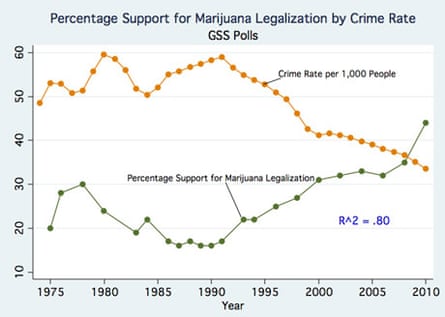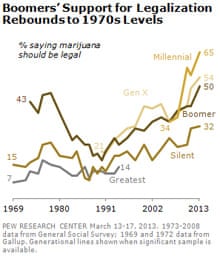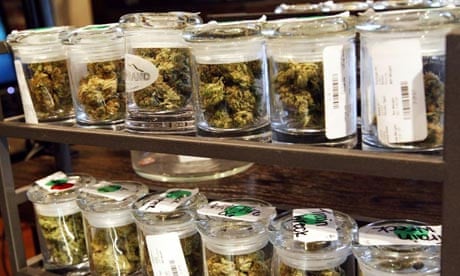Pew Research has found that a record high 52% of Americans believe marijuana should be legal. That's up from 45% in 2011 and just 41% in 2010. The charge has been led by 18 to 29 year olds. So does that mean that weed is on its way to becoming legal in more places than it is now? Perhaps, but the public's opinion of marijuana is a lot more murky than the Pew surveys indicate.
First, Pew Research is on its own with seeing a rapid rise in weed legalization over the past three years. Other pollsters show the percentage of Americans who want to legalize weed staying steady. Angus Reid has polled the question five times since 2009 and has come away with 53%, 52%, 55%, 52%, and 54% in November 2012 in favor of legalization. There's no trend there.
CBS News has surveyed seven times since 2009 and has been up and down with 41%, 31%, 41%, 44%, 40%, 45%, and 47% in November 2012 in favor. Perhaps there's a slight tick upward, though it's unclear and certainly not near what Pew found. Gallup has gone at the question four times since 2009 with 44%, 46%, 50%, and then 48% in November 2012 in favor. The percentage who said it should not be made legal was 50% in 2010 and again in 2012.
The ABC/Washington Post poll clocked marijuana legalization at 46% in 2009, 46% in 2010, and 48% in November. Perhaps most importantly, the General Social Survey (GSS) came in at 44% in 2010 and 43% in 2012. I say most importantly because the GSS is generally seen as the gold standard of survey research. Response rates are at about 70% as compared to just 10% for most telephone surveys. This ensures that blacks and Latinos are better polled. It's the reason that Pew Research uses GSS data as opposed to other pollsters when their own data is unavailable.
All the data together suggests that there may be a little bit of a rise in the percentage of those favoring marijuana legalization over the past few years, but not 11 pts. Whether or not a majority support weed legalization is a question I'm unprepared to answer.
Second, the percentage of people in favor marijuana legalization tends to track with the crime rate.

Eighty percent of the differences in support for marijuana legalization nationwide since 1975 is explained by the change in the overall crime rate through 2010 (the last year in which we have the crime rate and GSS data). Crime rates are currently at very low levels nationwide, which could explain why we saw the demonstrated upswing of marijuana legalization in all polling during the first decade of this century. If we were to see an increase in the crime rate in the future, there's a pretty decent chance we'd see a decrease in support for marijuana.
You can actually see the percentage of Americans in favor of marijuana legalization actually dropped during the 1980s from the 1970s as drug acceptance seems to have been linked linked to a higher overall crime rate.
Third, demographics don't promise anything. This is the most interesting part of the weed debate as far as I'm concerned. Millennials (those in their 20s and early 30s) are more likely to say marijuana should be made legal than any other age group. That is likely to hold.
The baby boomer generation has pretty consistently been more likely to be okay with weed than the silent generation, while generation x members have been slightly more favorable to weed than the boomers.

Although the generational gaps have remained constant in relationship to each other, each generation has changed. Near 50% of baby boomers were in favor of legalization in the mid-to-late 1970s, yet that fell off to only about 20% by about 1990. That then rebounded to the 50% Pew saw in their latest poll. The most likely reason was because of the crime rate. Given that the crime rate is likely to rise at some point in the future, it's quite possible that the 65% of millennials in favor of weed legalization right now could drop off significantly as well.
Also, the next generation may not be as pro-marijuana as the millennials. During the 1980s, the increase in crime rate lead to an increase in drug prevention programs. These in turn lead students to believe that there was a greater risk in lighting up, which itself was highly correlated with marijuana usage. By the 1990s, the perceived risk fell, and you ended up with a generation that was the most-pro marijuana on record. If the perceived risk goes up among future generations as the crime rate goes up, future generations may not be nearly as pro-marijuana as the millennials.
Of course, the counter-argument to all of this is that some states have already legalized marijuana usage. People may see that the world isn't falling apart and marijuana may stop being an issue that is related to the crime rate.
For now, however, I would take the Pew poll and implications of it with a grain of salt. There's a reason why you don't see politicians coming out all over the place in favor of it like you do with same-sex marriage, despite the fact it actually polls higher per Pew Research. The great uptick in marijuana support over the past three years probably isn't where Pew says it is and a rise in support is in no way guaranteed in the future.
